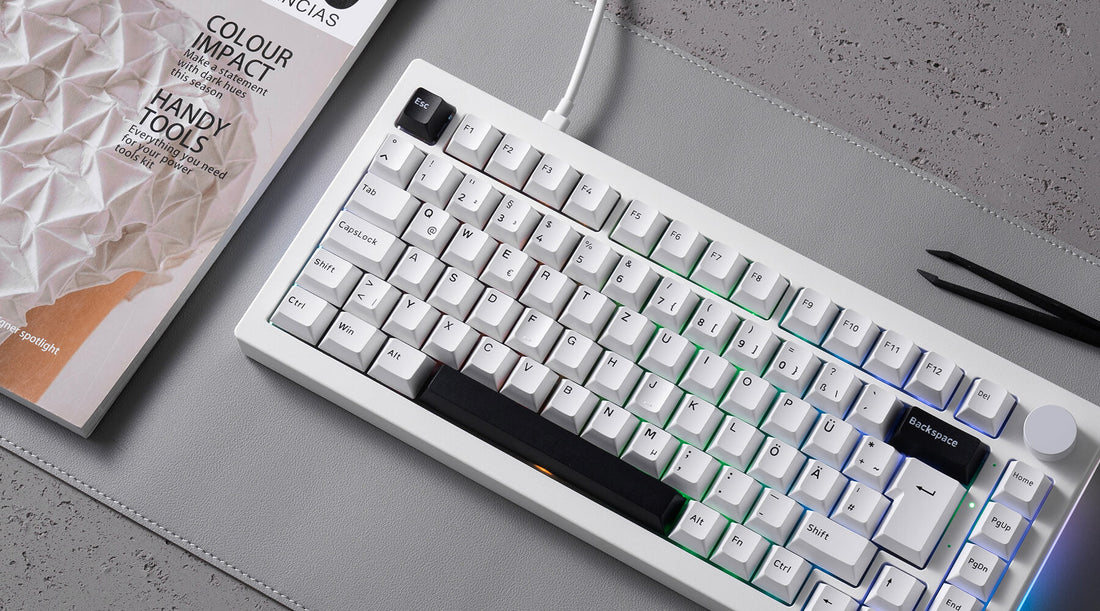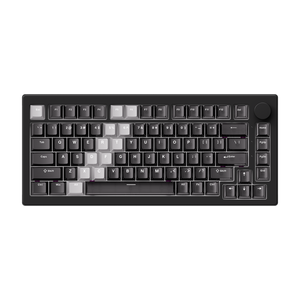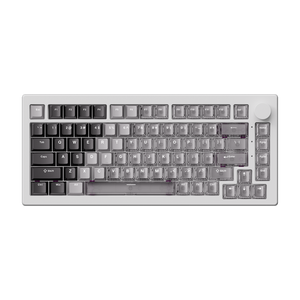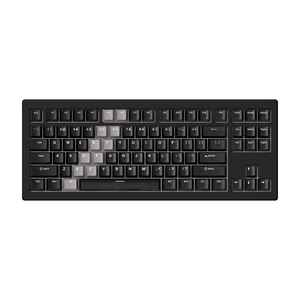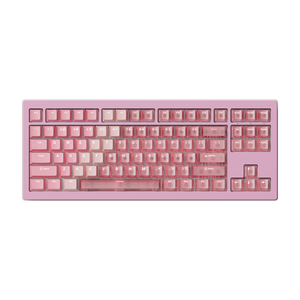Keyboards are an essential tool for interacting with computers—whether for work, play, or creative writing. But have you ever wondered what secrets lie behind the keys?
There are basically two main types of keyboards: mechanical keyboards and membrane keyboards . Both have their own characteristics, strengths, and passionate fans.
But what's the difference between these two keyboard types? Which is the right choice for you? Let's delve into the world of keyboards and discover their secrets!
Before we explore the differences between a mechanical and a membrane keyboard, let's first look at what makes each of these keyboards special.
What are mechanical keyboards?
The heart of a mechanical keyboard is its independent mechanical switch . Each key has its own switch, consisting of a spring and a metal contact.
The typing feel varies depending on the switch type:
-
Linear switches offer a smooth, soft keystroke without resistance.
-
Tactile switches have a noticeable resistance point that improves feedback.
-
Clicky switches combine tactile feedback with an audible click , providing a precise typing feel.
Click here to learn more about the differences between linear, tactile, and clicky switches .

What is the advantage of a mechanical keyboard?
Mechanical keyboards offer excellent typing feel, long lifespan, high adaptability, fast trigger response, good stability, a unique sound experience, and a reduced error rate.
1. Tactile and audible feedback
Mechanical keyboards offer a pleasant typing experience, from clicky (loud and tactile) to linear (soft and quiet).
2. Durable (50–80 million keystrokes)
Mechanical switches last significantly longer than membrane keyboards, which often only last 5–10 million keystrokes.
3. Highly customizable (keycaps, switches)
Users can swap out keycaps made of different materials (PBT, ABS) and profiles (OEM, Cherry, SA, etc.). Switches can be replaced or modified (hot-swappable keyboards allow for easy replacement).
4. Consistent and precise typing experience
Each keystroke is registered with consistent force and feedback, resulting in better typing consistency.
5. Full N-key rollover (pressing multiple keys simultaneously)
Especially important for gamers and fast typists, as each keystroke is registered independently.
6. Easy to clean and repair
Keycaps can be removed and thoroughly cleaned to prevent dirt buildup.
What are the disadvantages of mechanical keyboards?
1. Usually more expensive
High-quality mechanical keyboards are more expensive than membrane or scissor switch keyboards.
2. Can be loud
Clicky switches (e.g., Cherry MX Blue, Kailh Box White) produce loud noises that are less suitable for offices or shared spaces. Even quieter switches (e.g., linear or tactile versions) are often louder than rubber-domed keyboards.
3. Heavier than membrane keyboards
Mechanical keyboards are often larger and heavier due to their metal or high-quality plastic casing. They're less practical for travel than lightweight membrane or chiclet keyboards.
4. Higher power consumption (wireless models)
Wireless mechanical keyboards require more power due to powerful switches and RGB lighting.

What are membrane keyboards?
Membrane keyboards use membrane circuitry. They consist of three membrane layers: the top and bottom layers are coated with a conductive material, while the middle layer acts as a spacer.
When a key is pressed, it compresses an elastic silicone layer underneath, bonding the top and bottom layers together. This sends the signal to the computer.

What is the advantage of a membrane keyboard?
1. Cheaper than mechanical keyboards
Membrane keyboards are generally cheaper because they have a simpler design.
2. Quiet operation
Since membrane keyboards do not have mechanical switches, they produce less noise.
3. Lighter and easier to transport
Due to the thin rubber membrane, they are often more compact and lightweight. Easier to transport, ideal for laptops or mobile workstations.
4. Often more resistant to liquids
Many membrane keyboards are splash-proof or even waterproof. Their sealed design prevents liquids or dust from easily penetrating the interior.
What are the disadvantages of membrane keyboards?
1. Less durable
The membrane can wear out over time, making the keyboard less responsive. After several years of intensive use, keys may no longer register reliably. This is less durable than mechanical keyboards, which can last 50–80 million keystrokes.
2. Soft, “mushy” typing feel with little tactile feedback
The resistance when pressing is often spongy, as there are no true mechanical switches. There's no direct, tactile feedback like with tactile or clicky mechanical switches.
3. Limited customization options
Keycaps are usually not replaceable, as they are often bonded to the membrane. There's no way to customize the switches or the typing feel. Fewer choices in keyboard layouts, materials, and designs.
4. Limited N-key rollover (ghost key issues)
May have difficulty pressing multiple keys simultaneously. Ghosting issues occur if not all pressed keys are correctly recognized. This is particularly disadvantageous for gamers, as rapid multiple keystrokes are not always reliably registered.
5. More difficult to clean and repair
The membrane layer is usually permanently attached to the keyboard and cannot be easily replaced. Dust and dirt can accumulate under the keys, but removing the keycaps is often impossible. Once damaged, the entire keyboard often has to be replaced, as repairs are rarely worthwhile.
Main differences between mechanical and membrane keyboards
1. Structure: Mechanical switch vs. membrane layer
As mentioned above, each key on a mechanical keyboard has its own mechanical switch . This allows each key to operate with high precision, and each keystroke has a unique response, preventing accidental keystrokes.
The construction of a membrane keyboard is significantly simpler. Each key is connected to a rubber pad; there is no separate mechanical switch between the key and the membrane. When the key is pressed, the pad is pushed down to make contact with the circuit board. Depending on where the circuit board is touched, the keyboard sends different signals.
2. Typing feel: Direct vs. Soft
Mechanical keyboards feature independent mechanical switches, which typically have distinct actuation points. This allows you to feel the precision and security of each keystroke. Your fingers receive more feedback, allowing for a comfortable typing experience. Furthermore, different switch types offer different typing feel that remains consistent even after extended use.
In contrast, typing on a membrane keyboard feels smoother. There's no clear mechanical feedback when pressing a key, and the noise level is low. This makes membrane keyboards particularly well-suited for quiet work environments.
3. Durability: 50 million vs. 5 million keystrokes
The durability of mechanical keyboards is impressive. Each key has a lifespan of over 50 million keystrokes, and high-end models even exceed 80 million. Mechanical keyboards are also easy to maintain: keycaps can be easily removed and replaced, and the internal structure is easy to clean. This ensures a long service life.
The lifespan of membrane keyboards is significantly shorter, at approximately 5 million keystrokes. Due to their enclosed design, cleaning and maintenance are more complicated. If a key stops working or is damaged, the keyboard often cannot be repaired and must be replaced entirely. This puts membrane keyboards at a slight disadvantage in terms of durability.
4. Customization Options: Supported vs. Not Supported
Because mechanical keyboards are modular, they offer numerous customization options for keycaps, switches, casing, and other components. Models with hot-swappable switches, in particular, make customizing the keyboard much easier—components can be swapped out in just a few steps. In addition, mechanical keyboards often support macro programming, customizable backlighting, and other features that enhance productivity and the gaming experience.
Membrane keyboards, on the other hand, offer limited customization options. Because they consist of a single, continuous membrane layer, individual components such as keycaps or switches are difficult to replace. While some membrane keyboards allow for minor customizations such as colored keycaps or stickers, they generally lack the flexibility and modularity of mechanical keyboards.

5. Costs: High Costs vs. Low Costs
The production costs of mechanical keyboards are high, which also makes them comparatively expensive. High-end models with backlighting, programmable keys, and other advanced features drive up the price even further. However, high costs also mean better quality and a first-class user experience. If you have high demands on a keyboard, a mechanical keyboard is undoubtedly a worthwhile investment.
Membrane keyboards, on the other hand, have a simple structure, low production costs, and are correspondingly cheaper. For users with limited budgets or low keyboard requirements, membrane keyboards are a very affordable choice. They are particularly cost-effective for everyday office use or light-duty scenarios.
6. Noise level: Loud vs. quiet
Mechanical keyboards are known for their clearly audible typing noise. The sound varies greatly depending on the switch type: Clicky switches produce a very audible click, which is suitable for users who prefer audible feedback; linear switches, on the other hand, are quieter and ideal for environments where quiet is required. In general, mechanical keyboards are louder, which can be particularly annoying in offices or public spaces.
In contrast, membrane keyboards are quieter because they don't produce a distinct mechanical noise. This makes them ideal for quiet work environments. The typing sound of membrane keyboards is relatively smooth and unobtrusive, so they don't disturb the environment—a good choice for locations where quiet working is required.
7. N-Key Rollover: Multiple Keys vs. Single Key
Mechanical keyboards are characterized by their excellent ability to handle multiple simultaneous keystrokes. Most mechanical keyboards support high N-key rollover or even complete key conflict freedom. This means that multiple keys can be pressed simultaneously, and each individual input is precisely recognized and processed. This is especially beneficial for gaming and fast typing. During complex game actions, mechanical keyboards prevent input errors caused by key conflicts, thus ensuring a better gaming experience.
Most membrane keyboards have a lower N-key rollover, usually between 2 and 6 keys. This means that conflicts can occur when pressing multiple keys simultaneously, and some inputs may not be recognized. This can be particularly problematic in gaming when multiple keys need to be pressed simultaneously, as it can lead to input delays or errors. However, for normal office use and light use, this issue is barely noticeable and meets basic requirements.

8. Reaction time: Fast vs. Slow
Mechanical keyboards are extremely responsive. Thanks to independent mechanical switches, a key activates instantly upon pressing, with an average response time of just 1 millisecond. This fast responsiveness is especially beneficial for gamers and users who need to type quickly, as it reduces input lag and improves precision. In scenarios that require high responsiveness, mechanical keyboards offer outstanding performance.
The response time of membrane keyboards is comparatively slower. When a key is pressed, the membrane must make contact with the underlying layer to complete the electrical circuit. This results in an average response time of 5 to 10 milliseconds. While this speed is sufficient for normal office use and occasional use, it can lead to lag during demanding gaming sessions or rapid typing.
Which keyboard is better for you?
For gaming
If you want a keyboard that will take your gaming experience to the next level, a mechanical keyboard is a great choice. Fast response times are crucial in gaming – mechanical keyboards have a faster response time, usually under 1 millisecond. They also support N-Key Rollover (NKRO), allowing multiple keys to be pressed simultaneously and every input to be recognized accurately. In addition, there is a wide selection of switches and keycaps to suit the individual preferences of different players.
Get our Hall effect keyboard and improve your gaming!

For programming
Mechanical keyboards are considered better for programmers than membrane keyboards. They offer clear tactile feedback, making each keystroke clearly perceptible. This can improve typing accuracy and speed for experienced programmers.
For daily office use
Membrane keyboards are better suited for general office work and light use, especially in quiet environments. Their simple design and lightweight make them ideal for laptops and other portable devices. If you're looking for an affordable, lightweight, and portable keyboard, a membrane keyboard is the perfect choice.
Conclusion
Simply choose the keyboard that's most comfortable for you! Consider your typing habits, your work or leisure environment, and your budget to make the best choice. Explore the world of keyboards and let the right one take your typing experience to a new level. Simply choose the keyboard that offers you the most comfort!

